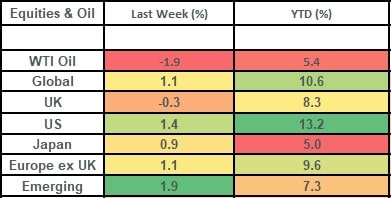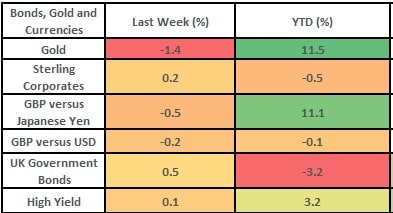Global stock markets bounced a little last week, rising by just over 1%. Whilst the bulk of the gains were driven by the US share market (and the technology sector in particular), there were also some notable gains for emerging market shares last week. Most of the data this week is squeezed into Wednesday! The day starts early with Chinese inflation data, moves onto UK growth data and closes out with the US Federal Reserve meeting where they’ll be updating their interest rate forecasts.
Last week
- Global stock markets rose last week, with the US technology sector driving gains.
- Emerging market stocks bounced back: driven by the Indian share market.
- Bond markets rose modestly.
- The European Central Bank cut interest rates to 3.75%.
- US jobs data showed strong gains, but other economic data was less positive.
This week
- This week we have US inflation (CPI) data due out on Wednesday and then the conclusion of the Federal Reserve meeting on Wednesday night. We don’t expect the Fed to cut interest rates but it will be a key meeting as they are due to release an updated version of their “dot plot” : which shows where they expect interest rates to be in the future (the most recent one has 3 interest rate cuts for this year, so we expect that to be revised up (i.e. less rate cuts): the question for markets is by how much!)
- In the UK we’ve got the monthly growth figure for May being released on Wednesday along with labour market data (Tuesday) and house price data (Wednesday)
- Wednesday also sees the release of Chinese inflation data.
- The Bank of Japan meet at the end of the week, where they’re expected to hold interest rates at 0.1%.

 Equity returns are in GBP, Oil is in USD. Gold is shown in GBP. Bond returns are all shown in GBP. Source Bloomberg.
Equity returns are in GBP, Oil is in USD. Gold is shown in GBP. Bond returns are all shown in GBP. Source Bloomberg.
More detail:
- Global stock markets rose by just over 1% last week, with most of the gains being driven by technology, health care and the consumer discretionary sectors. AI chip maker Nvidia drove gains in the technology sector, with the stock rising by just over 10% on the week. This takes gains for the year-to-date for Nvidia to just shy of 145%, with Nvidia alone accounting for over 1/3rd of all US stock market returns so far this year!
- Emerging markets also got a bounce last week, rising by 1.9%. Gains here were driven by the Indian and Chinese markets. Indian markets got a relief rally post the election result which saw Narendra Modi’s BJP party lose seats, but it did see Modi secure a 3rd term as leader of a coalition government. Chinese stock markets also bounced back as survey data (such as the Caixin China PMI Composite series) came in strong, trade data improved, and home sales data showed signs of improvement.
- The big news on the week was the interest rate cut from the European Central Bank (the “ECB”) and the strong monthly jobs numbers from the US. The ECB cut interest rates by 0.25% to 3.75%. This joins other G10 Central Banks such as Sweden, Switzerland and Canada in making interest rate cuts. The cut from the ECB was very well telegraphed, but it was viewed by the market as quite a cautious cut: the ECB combined the rate cut with an upward revision to their inflation forecasts, with ECB President Christine Lagarde noting that inflation “is likely to stay above target well into next year”. Eurozone inflation is currently running at 2.4%, having peaked at 10.6% in October 2022.
- The US monthly jobs numbers showed that 272,000 new jobs had been added to the US economy in May. This was much more than the 180,000 number that had been expected (by economists surveyed by Bloomberg). Whilst this number alone speaks to a very strong US economy, there was also some fairly downbeat data earlier in the week around the manufacturing sector which helped bond yields to fall and interest rate cuts remain priced into bond markets (with the first one in the US set for November this year).
- Bond markets gained ground last week as yields fell back. UK gilts rose by about 0.55% and US Treasuries rose by about 0.4%. Investment Grade credit bonds lagged a little, with spreads on these bonds rising slightly as new issuance boosted supply. The UK 10-year gilt closed out the week yielding 4.26%.
The value of investments and the income from them can go down as well as up and you could get back less than you invested. Past performance is not a reliable indicator of future performance.
The content of this article is not intended to be or does not constitute investment research as defined by the Financial Conduct Authority. The content should also not be relied upon when making investment decisions, and at no point should the information be treated as specific advice. The article has no regard for the specific investment objectives, financial situation or needs of any specific client, person, or entity.



